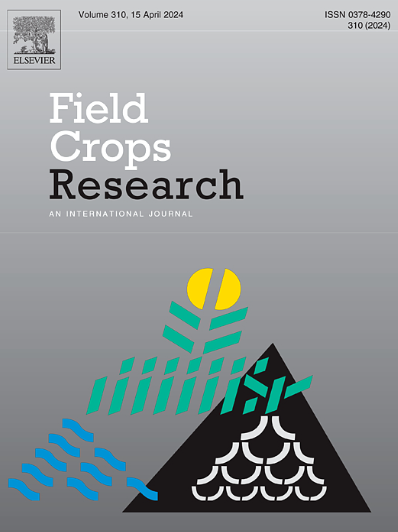夜间变暖影响主要粮食作物的产量:一项全球荟萃分析
IF 6.4
1区 农林科学
Q1 AGRONOMY
引用次数: 0
摘要
目前的研究和对气候变化的未来预估表明,以夜间温度相对于白天温度增加更多为特征的不对称变暖。温暖的夜晚对作物产量产生负面影响,对全球粮食安全构成挑战。夜间变暖的影响因作物种类、发育阶段、地区和实验条件而异。本荟萃分析综合了小麦、水稻、玉米和大豆在受控(即温室和生长室)和田间条件下的59项研究(680项观察)数据。结果显示,由于夜间平均升温~ 4.5°C,平均产量下降~ 25 %,其中水稻(~ 33 %)和小麦(~ 21 %)受影响最大,其次是玉米(~ 10 %),而大豆没有显著变化。受控条件下的产量损失(~ 41 %)比实地研究(~ 10 %)更为明显,可能是由于实验设置和温度强度的差异。在小麦和水稻产量决定和灌浆发育的关键时期,产量下降最为显著,特别是在较高的增温强度下。对照研究报告,与田间研究相比,夜间温度每升高°C,产量损失更高:水稻为4.7 %,小麦为1.0 %,小麦为5.5 %,小麦为0.5 %。这些发现强调了对照实验在理解生理影响和评估其机制方面的价值,但往往高估了产量损失,强调需要更多基于现场的方法来更好地代表现实世界的条件。这项研究强调,迫切需要将实验方案标准化,并将研究重点放在易受气候变化影响地区的玉米和大豆等主要作物以及高粱、小米和豆类等其他粮食安全作物上。结合先进的表型、建模和田间适应技术,对于制定有效的适应、缓解和复原力战略,以应对夜间变暖对全球作物生产的影响至关重要。本文章由计算机程序翻译,如有差异,请以英文原文为准。
Nighttime warming affects yields of major grain crops: A global meta-analysis
Current studies and future projections of climate change indicate an asymmetric warming characterized by a greater increase in nighttime temperatures relative to daytime temperatures. Warmer nights negatively impact crop yields, posing challenges for global food security. The effects of nighttime warming vary by crop species, developmental stages, regions, and experimental conditions. This meta-analysis synthesizes data from 59 studies (680 observations) on wheat, rice, maize, and soybean under controlled (i.e., greenhouses and growth chambers) and field conditions. Results show an average yield reduction of ∼25 % due to a mean nighttime warming of ∼4.5 °C, with rice (∼33 %) and wheat (∼21 %) being most affected, followed by maize (∼10 %), while soybean showed no significant changes. Yield losses were more pronounced under controlled conditions (∼41 %) than in field studies (∼10 %), likely due to differences in experimental setups and temperature intensities. Yield reductions were most significant during the critical periods of development for yield determination and grain-filling in wheat and rice, especially under higher warming intensities. Controlled studies reported higher yield penalties per °C increase in nighttime temperature compared to field studies: 4.7 % vs. 1.0 % in rice and 5.5 % vs. 0.5 % in wheat. These findings highlight the value of controlled experiments for understanding physiological impacts and assessing their mechanisms, but frequently overestimate yield penalties, emphasizing the need for more field-based approaches to represent real-world conditions better. This study underscores the urgency of standardizing experimental protocols and focusing research on major crops like maize and soybean, as well as other food-security crops like sorghum, millets, and legumes, in regions vulnerable to climate change. Incorporating advanced phenotyping, modeling, and field-adapted technologies will be crucial for developing effective adaptation, mitigation, and resilience strategies to combat nighttime warming’s impacts on global crop production.
求助全文
通过发布文献求助,成功后即可免费获取论文全文。
去求助
来源期刊

Field Crops Research
农林科学-农艺学
CiteScore
9.60
自引率
12.10%
发文量
307
审稿时长
46 days
期刊介绍:
Field Crops Research is an international journal publishing scientific articles on:
√ experimental and modelling research at field, farm and landscape levels
on temperate and tropical crops and cropping systems,
with a focus on crop ecology and physiology, agronomy, and plant genetics and breeding.
 求助内容:
求助内容: 应助结果提醒方式:
应助结果提醒方式:


